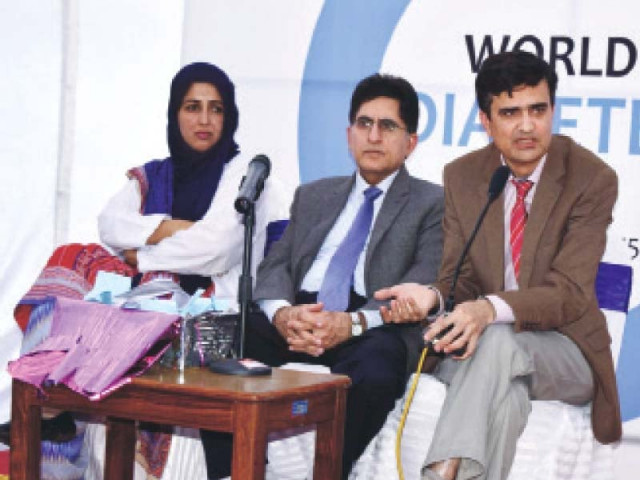World Diabetes Day: Experts urge public to adopt healthier lifestyles
Say diet, physical activity play major role in determining severity of disease

Preventive measures such as regular medication, proper blood glucose level tests, exercise and a balanced diet were advocated. PHOTO: EXPRESS
Asians are most likely to suffer from diabetes, with China and India topping the list of most affected countries. Pakistan stands at number 10.
This was said by Dr Usama Ishtiaq, consultant endocrinologist at Shifa International Hospital (SIH), at a seminar marking World Diabetes Day.
Themed around ‘healthy living and diabetes’, a large number of patients, students and doctors attended the seminar that offered free blood glucose tests to participants.
Dr Ishtiaq said that around 86,000 children develop type-I diabetes every year.
“Any Pakistani from the age of 20 to 79 can develop diabetic complications,” he said.
According to Dr Tayyab Badshah, consultant endocrinologist at SIH, diabetes is a chronic disease, affecting more than 7 million people in the country.
He said that 18 per cent of expecting mothers were likely to develop gestational diabetes during pregnancy, making it the most common type of diabetic complication among pregnant women.
“Although a temporary disorder that usually disappears after child birth, mothers who do not suffer from gestational diabetes are even more at risk during their second pregnancy,” he added.
Advising the audience to adopt healthier eating habits, Badshah said diabetic patients can avoid serious complications by taking up several preventive measures such as regular medication, proper blood glucose level tests, regular exercise and a balanced diet.
“Commercially produced bread and cereal may seem like a short cut to fixing your breakfast, but it cannot compete with natural and unprocessed foods,” he said.
“Healthy food helps the body maintain healthy blood sugar levels, while processed items leave one feeling hungry,” Badshah added.
Listing symptoms of the disease, Dr Ishtiaq said feeling severe thirst, fatigue and weakness, weight loss and frequent urination should be taken as clear symptoms of diabetes.
Highlighting the importance of diet in treatment, Clinical Dietician Zainab Ghayyur said factors such as previous medical history, dietary routines, height, weight, age, eating patterns and physical activity play a major role in determining the severity of the disease.
According to the dietician, high fibre food items such as barn, wheat, fruits and vegetables can prove very helpful in not just keeping diabetes in control but in avoiding other complications such as heart disease.
Published in The Express Tribune, November 15th, 2015.



















COMMENTS
Comments are moderated and generally will be posted if they are on-topic and not abusive.
For more information, please see our Comments FAQ